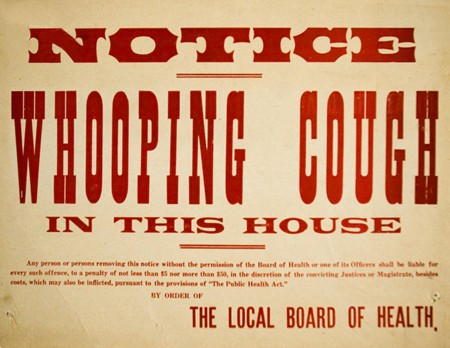
 An outbreak of whooping cough in New Brunswick that now has at least 30 confirmed cases may be another indication that the bacterial disease is making a long-lasting comeback.
An outbreak of whooping cough in New Brunswick that now has at least 30 confirmed cases may be another indication that the bacterial disease is making a long-lasting comeback.
“Cases were spreading out within the region, which at that point is when I decided to declare it an outbreak,” says New Brunswick Medical Officer of Health Dr. Yves Léger. Léger told CTV that cases tend to jump every three to five years.
While whopping cough may be indeed be cyclical in its occurrence, a larger trend reveals a disease that is making a troubling comeback.
The numbers on the incidence of whopping cough seem to tell a clear story: its decline moves in lockstep with the discovery of the vaccine for it in the 1940s and its resurgence, like that of the measles, correlates with a recent decline in people getting vaccinated.
But there is another issue: the whooping cough vaccine seems to be becoming less effective as the bacteria that causes the disease appears to be mutating. CDC scientist Lucia Pawloski says mutations were found in 60% of whooping cough samples.
Whooping cough, or Pertussis, is an airborne disease that is caused by the bacterium Bordetella pertussis. Its onset feels much like a common cold, but then causes lengthy bouts of coughing that give the disease its other nickname, “100-day cough”. The condition can be dangerous, especially to children, whose mortality rate from the disease is approximately two per cent.
The Centers for Disease Control and Prevention (CDC) tracks the number of annual cases of pertussis, or whopping cough, in the United States every year. The incidence of the bacterial disease peaked in the 1930’s and dropped consistently for decades. In 1934, there were 265,269 cases. That fell to just 1010 in 1976. But recent numbers are climbing. In 2012, there were 48,277 cases. The average number of cases in the United States between 2010 and 2014 was 31,231.
William Schaffner, a professor at the Vanderbilt University School of Medicine says the anti-vaccination movement plays a smaller role in the disease’s resurgence than that of the measles. Unlike the highly effective measles vaccine, which provides lifelong protection, shots for whooping cough often have to be administered multiple times.
The measles vaccine is, in fact, only 85-to-88% effective, which explains why someone can easily contract the disease even if they have been vaccinated. But those who aren’t vaccinated end up moving a very important needle a few percentage points. That needle is called “herd immunity”. Scientists consider an eradication level of 95% ensured what is referred to as herd immunity or “community immunity”. In the case of most vaccine preventable diseases the equation is completely binary; the more people are vaccinated, the less chance society at large will suffer from outbreaks. But Canada is lagging in all categories.
Recently released data from Stats Canada on childhood immunization revealed that about 89% of two-year-olds had received the recommended number of immunizations against measles, mumps and rubella and about 77% of two-year-olds had received the required number of shots for diphtheria, pertussis (whooping cough) and tetanus.
Back in New Brunswick, Léger says people thinking about skipping their shots would be the refusing the single most effective thing they can do to protect themselves from whooping cough.
“The vaccine isn’t perfect, but one of the best measures we have,” he said.
Comment
Leave a Reply
You must be logged in to post a comment.



 Share
Share Tweet
Tweet Share
Share




“The condition can be dangerous, especially to children, whose mortality rate from the disease is approximately two per cent.” Incorrect. It is dangerous to small infants, not to children. http://www.cdc.gov/vaccines/vpd-vac/pertussis/fs-parents.html “Whooping cough can even be deadly. From 2000 through 2014, there were
277 deaths from whooping cough reported in the United States. Almost
all of the deaths (241 of the 277) were babies younger than 3 months of
age, who are too young to be protected against whooping cough by
getting the shots.”
Not mentioned in the article is that vaccinated people can carry and transmit the bacteria that causes whooping cough. Vaccinated people can also get sick with whooping cough, but symptoms can be atypical, making it less likely to be diagnosed. This helps spread the illness.